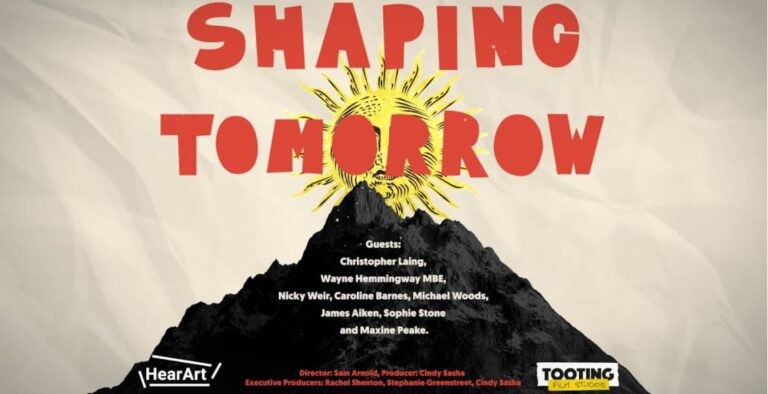Shaping Tomorrow is an all-new Deaf-led video podcast produced by a 90% Deaf production team, available today.
Here Art, the British social enterprise co-founded by Cindy Sasha and Academy Award winner Rachel Shenton, has launched a podcast on its YouTube Chanel.
Announced in July last year, the series is in British Sign Language and focuses on the careers of deaf people in the creative, sports and entertainment industries, and the challenges and things they have faced along the way. The first Deaf video podcast to reveal how things have changed. time.
The first of the four-episode series features designer and entrepreneur Wayne Hemingway MBE. He had a frank and candid conversation with deaf architect Christopher Lane, discussing their comparative experiences and journeys in the same industry.
Christopher talks about the limitations faced by deaf architects, the founding of DAF (Deaf Architectural Front), and his support for young people looking to follow in his footsteps. They need knowledgeable support to help them switch off and focus on what they need to do for their education. ”
In Episode 2, makeup artist Caroline Burns talks to deaf makeup artist Nikki Weir about how Nicki, who is profoundly deaf but incredibly visual, has helped her on her journey. She also talks about how cruel the makeup world can be to deaf people. “When I first started working, people would laugh at the way I spoke and say, 'Nicky, pick up the phone,' because they knew I couldn't do it because I was deaf.
“I think people need to be more supportive, a little bit more understanding, and really encourage us to get into the industry and be welcomed into the industry. I want to pass the baton to people who really want to do it without any hurdles. .”
In Episode 3, deaf mountaineer Michael Woods speaks with adventurer and solo climber James Aiken about the obstacles he faces in achieving his dream of climbing Mount Everest.
He talks about the challenges of navigation while climbing, where he has to sign the BSL in fog, read the BSL with a headlamp in his face, and call 999 in case of an emergency. Tell deaf people that I can do it, you can do it too, just like me. And that's also my motivation.
“It's not something everyone can do. It takes preparation, it takes years, and it's not something you just decide to do one day. It takes training.”
In episode 4, actress Maxine Peake tells deaf actress Sophie Stone that she was always told that she couldn't make a living as a deaf actor, and that even though she wanted to become an actor, she was always restrained. He talks about the roles he has been given and the roles of deaf and dumb people. A role full of vitality.
She talks about learning how to speak in different roles, the doubts she had about herself, and the fact that she had to work twice as hard as her peers. The story, the characters you fall in love with, the great sex life, killing a bunch of people with a gun, threatening a bank, etc.
“I was never given a role like that. I was given a vulnerable, sad, pathetic, lonely, weak woman. I was tired of it. I was given roles to be submissive to and to be pitied, and all the while I was really frustrated.”
Sam Arnold, who recently produced the award-winning film Name Me Rawand, directed series one of Shaping Tomorrow, which brought together a talented deaf crew, and said: states. industry.
“Cindy at Hear Art and I shared the same vision to create a platform for them. As the Deaf Director, I am passionate about enhancing the video podcast experience to engage Deaf and hearing people. I am passionate about making you.
“This is especially important for hearing-impaired viewers who are disadvantaged and don’t have access to many audio-only podcasts or end up seeing unattractive shots of two people talking.”
The first episode will be available exclusively on YouTube, with the remaining episodes released every two weeks, with each episode rolling out on Spotify, Audible, and Apple Podcasts in early November.


